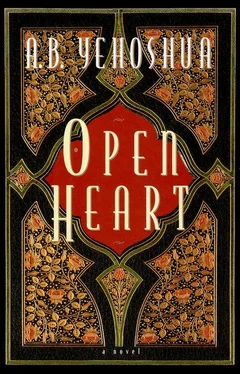A. Yehoshua - Open Heart
Здесь есть возможность читать онлайн «A. Yehoshua - Open Heart» весь текст электронной книги совершенно бесплатно (целиком полную версию без сокращений). В некоторых случаях можно слушать аудио, скачать через торрент в формате fb2 и присутствует краткое содержание. Год выпуска: 2014, Издательство: Peter Halban, Жанр: Современная проза, на английском языке. Описание произведения, (предисловие) а так же отзывы посетителей доступны на портале библиотеки ЛибКат.
- Название:Open Heart
- Автор:
- Издательство:Peter Halban
- Жанр:
- Год:2014
- ISBN:нет данных
- Рейтинг книги:3 / 5. Голосов: 1
-
Избранное:Добавить в избранное
- Отзывы:
-
Ваша оценка:
- 60
- 1
- 2
- 3
- 4
- 5
Open Heart: краткое содержание, описание и аннотация
Предлагаем к чтению аннотацию, описание, краткое содержание или предисловие (зависит от того, что написал сам автор книги «Open Heart»). Если вы не нашли необходимую информацию о книге — напишите в комментариях, мы постараемся отыскать её.
Open Heart — читать онлайн бесплатно полную книгу (весь текст) целиком
Ниже представлен текст книги, разбитый по страницам. Система сохранения места последней прочитанной страницы, позволяет с удобством читать онлайн бесплатно книгу «Open Heart», без необходимости каждый раз заново искать на чём Вы остановились. Поставьте закладку, и сможете в любой момент перейти на страницу, на которой закончили чтение.
Интервал:
Закладка:
Mourners were packed into the plaza — their numbers exceeded all my expectations, and many appeared to be truly grieving, for throughout the crowd I saw tears sparkling in the eyes of men and women as they listened to the eulogy delivered by the medical director of the hospital, a gray, retiring man who began by reading in a low clear voice from the notes he had prepared about Lazar’s life history. Lazar had been born and brought up only two or three streets away from the hospital. In his youth he had studied medicine, but in his second year he had had to abandon his studies because of his father’s illness and go to work to support his younger brother and sister, recognizable in the circle surrounding Dori by their physical resemblance to their brother. From a distance it seemed that the two of them were careful not to get too close to Dori, as if they feared that this pampered, vivacious woman’s rage at being left alone by her husband might be greater and more violent than her grief. Even her mother kept her distance, standing with her grandchildren on either side of her, the three supporting each other. Only Hishin, perhaps by virtue of his medical authority, which in the eyes of the Lazars was absolute, dared to approach Dori and take her arm as she stood steadily on her straight legs, her left foot even at this difficult time in the lax, slightly out-turned position I always found so appealing. Hishin had honored the occasion by wearing a black suit, but instead of a skullcap he wore an old black baseball cap on his head, which gave him the air of a sorrowful bird. As someone who had stood at his side for many hours next to the operating table and learned to sense every shift in his mood, I felt even from a distance the tremendous tension in his movements, as if he were about to whip out a knife and operate on himself. I did not yet know that he had claimed the right to eulogize Lazar at the graveside and that he was going over the first sentences of his speech in his mind as his little eyes scanned the hostile audience. Dori’s eyes too wandered over the people around her, but it did not look as if any sentences, or even words, were coming into her mind. She was so stunned by the catastrophe that she didn’t even realize how her eyes, encountering the familiar faces of her friends, lit up, even at this terrible time, in the old, friendly smile, although the light was so dim and weak that I thought my heart would break.
The next day in the Lazars’ apartment, among the many people filling the large living room — Dori wearing the black velvet jumpsuit I remembered, her face pale and free of makeup — I heard her asking about the eulogies that had been delivered outside the hospital, admitting that she had been unable to take in what was being said. But although the people surrounding her tried their best, none of them could remember the details. When I could no longer restrain myself, I intervened from the other end of the room and repeated almost word for word not only Lazar’s biography as sketched by the medical director but also the emotional phrases of the mayor, who had obviously felt both affection and respect for Lazar in spite of the bitter financial disagreements between them. But there was no need to repeat Professor Hishin’s words next to the freshly dug grave to her, both because she, like everyone else there, could not forget their power and eloquence and because Hishin himself was now sitting beside her with the strange young woman who was his mistress or perhaps already his wife and who lived for most of the year in Europe. During the week following the funeral he went to see the Lazars twice a day, partly to give his support and protection to the widow of his good friend, who was a beloved friend in her own right, and maybe partly to confront, if necessary, any complaints against him then and there. So it was only natural that in the quiet stir of people coming and going he would not overlook my presence. Even though I was sitting in a remote corner of the room, far away from him, I could feel his eyes returning to me, trying to guess if I intended to surprise Dori with something she did not yet know. But I had no desire to surprise anybody. The heaviness I had felt inside ever since Lazar’s death, accompanied from time to time by a slight dizziness, as if I had no control over what was happening inside me, had banished any complaints from my mind, especially any complaints against Hishin, who could never have guessed that the pity that flooded me at the sight of Dori’s and Einat’s tearstained eyes was accompanied by a great and paralyzing joy, which made me forget my manners, and instead of getting up to take my leave after half an hour and giving my seat to one of the other people who kept streaming in through the open door, I stubbornly sat where I was, nodding somberly to acquaintances from the hospital, as if I too were one of the mourners here.
While I could not count myself as a member of the grieving family, I felt that I secretly belonged here in this apartment, although I had only briefly visited it twice before, including on the eve of the trip to India, and from the moment I crossed the threshold I felt warmly and intimately at home. Ever since the return from India it had been the scene of my constant fantasies, and now the wounded spirit of the master of the house, which had been compassionately gathered into my soul, enabled me not only to get up and go into the kitchen without asking permission to pour myself a glass of cold water, but even to advance down the hallway and peep into the bedroom where I had given Lazar and his wife their vaccination shots before we left for India. After all, Dori, who had invaded the bedroom of a strange house in London, could hardly rebuke me for standing mesmerized in the doorway of her large, elegant bedroom, where the soft autumn twilight turning the big windows red only intensified my distress at the sight of the female clothes thrown onto the bed and the chairs, the scattered shoes, the drawers left open in a kind of chaos, which to the best of my knowledge would have infuriated Lazar. No wonder I jumped at the light touch on the back of my neck. It was Hishin. His tall body had seemed slightly stooped during the last few days, and his little eyes were tired and bloodshot. Was he looking for something too, or had he simply followed me here? He stood silently next to me, as startled as I was at the sight of the chaos created by the despairing and perhaps also angry widow. “Have you ever been here before?” He surprised me by the strange question. “A long time ago”—I blushed—“before the trip to India.” Suddenly it occurred to me that he wasn’t referring to the apartment but to the bedroom itself, and I continued hesitantly, “I vaccinated both of them here before the trip.” He nodded his head. There was something profoundly attentive in his manner toward me. Ever since Lazar’s death, and despite the great difference in our status, I had felt that there were unanswered questions between us, connected more with medical ethics than with medicine itself. But since I had never seen him so vulnerable before, I was careful to avoid saying anything that might upset his confidence in the natural course of events leading to the death and in the impossibility of preventing it. My curiosity on one point, however, was so intense that I couldn’t stop myself from asking: how did Professor Adler, who had performed the operation, explain what had happened? “Bouma?” cried Hishin angrily, and the childish nickname seemed intended now to shrink the Jerusalem master back to his natural human dimensions. “He doesn’t know anything about it. He left the country right after the operation and he won’t be back until next week. But what can he tell us, Benjy, that we don’t already know? You know yourself that the ventricular tachycardia had nothing to do with the surgery, which you saw succeed with your own eyes.” A warm surge of happiness welled up in me to hear Hishin using my diagnosis as if it had now been confirmed as the absolute, undisputed truth.
Читать дальшеИнтервал:
Закладка:
Похожие книги на «Open Heart»
Представляем Вашему вниманию похожие книги на «Open Heart» списком для выбора. Мы отобрали схожую по названию и смыслу литературу в надежде предоставить читателям больше вариантов отыскать новые, интересные, ещё непрочитанные произведения.
Обсуждение, отзывы о книге «Open Heart» и просто собственные мнения читателей. Оставьте ваши комментарии, напишите, что Вы думаете о произведении, его смысле или главных героях. Укажите что конкретно понравилось, а что нет, и почему Вы так считаете.












